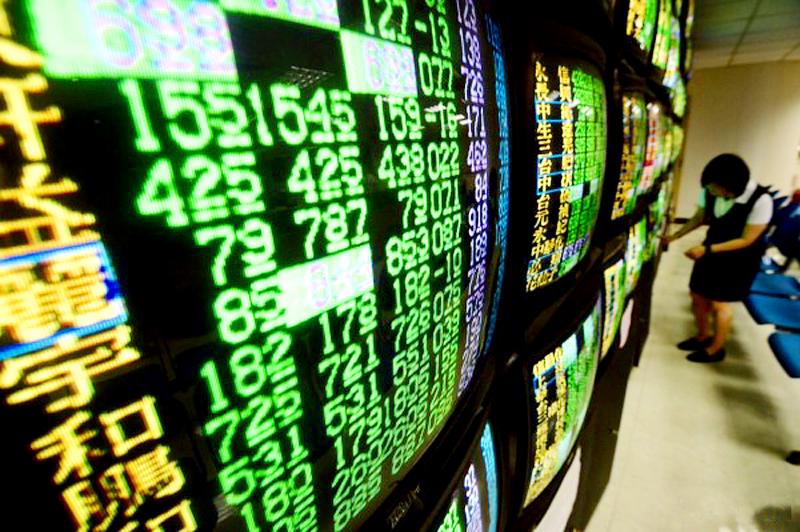The TAIEX yesterday closed below 16,000 points after eroding earlier gains, as many investors rushed to sell following an initial upturn, dealers said.
While the US Federal Reserve’s decision to increase its benchmark interest rate temporarily removed uncertainty from the markets, investors shifted their attention to the economy amid fears that rising rates would hurt market fundamentals, they said.
The TAIEX closed down 160.64 points, or 1 percent, at 15,838.61. Turnover totaled NT$272.345 billion (US$9.16 billion), with foreign institutional investors buying a net NT$647.96 million of shares on the main board, Taiwan Stock Exchange data showed.

Photo: Fang Wei-jie, Taipei Times
Led by contract chipmaker Taiwan Semiconductor Manufacturing Co (TSMC, 台積電), the TAIEX briefly rose above 16,200 points before many investors shifted to the sell side to lock up earlier gains by selling across the board, which brought the main board down to negative territory by the end of the session.
“The 75 basis-point rate increase by the Fed had been priced in after the global markets. In particular, the US markets encountered volatility in recent sessions amid rising inflation,” Hua Nan Securities Co (華南永昌證券) analyst Lu Chin-wei said.
“Although the rate hike decision removed market uncertainty for now, concerns are growing that higher borrowing costs will hurt the economy, as the Fed is expected to continue its rate hike cycle down the road,” Lu said.
TSMC, the most heavily weighted stock in the local market, saw earlier gains erased, but still closed above its previous closing level, rising 0.4 percent to NT$508, off a high of NT$516.
Soon after the local market opened, TSMC shares returned to the stock’s prior ex-dividend level by soaring by NT$9, indicating that investors remained upbeat about its sound fundamentals.
TSMC, which started to issue cash dividends on a quarterly basis instead of annually in 2019, saw its opening reference price cut by NT$2.75 from its previous close, as the company is to issue a NT$2.75 cash dividend per share for its earnings in the fourth quarter of last year. The payment is scheduled for July 14.
Old economy stocks were also affected by a retreat from their earlier gains, with the transportation sector falling 4.8 percent in the wake of a US government initiative to rein in fast-growing ocean cargo shipping rates, dealers said.
On Tuesday, US President Joe Biden said he would sign the Ocean Shipping Reform Act into law to make ocean shipping more efficient and lower costs as part of efforts to fight inflation.
The financial sector appeared resilient, closing little changed, as a rate hike is expected to expand banks’ interest spreads and boost their profitability, dealers said.
“With interest rates in the US on the rise, the US dollar is expected to remain stronger against the New Taiwan dollar, so the local equity market could continue to see liquidity flight as foreign institutional investors move their funds to US dollar-denominated assets,” Lu said.
“The silver lining is that funds managed by the government are likely to jump in as they did in recent sessions to prevent the TAIEX from falling too much,” Lu added.

South Korea’s equity benchmark yesterday crossed a new milestone just a month after surpassing the once-unthinkable 5,000 mark as surging global memory demand powers the country’s biggest chipmakers. The KOSPI advanced as much as 2.6 percent to a record 6,123, with Samsung Electronics Co and SK Hynix Inc each gaining more than 2 percent. With the benchmark now up 45 percent this year, South Korea’s stock market capitalization has also moved past France’s, following last month’s overtaking of Germany’s. Long overlooked by foreign funds, despite being undervalued, South Korean stocks have now emerged as clear winners in the global market. The so-called “artificial intelligence

‘SEISMIC SHIFT’: The researcher forecast there would be about 1.1 billion mobile shipments this year, down from 1.26 billion the prior year and erasing years of gains The global smartphone market is expected to contract 12.9 percent this year due to the unprecedented memorychip shortage, marking “a crisis like no other,” researcher International Data Corp (IDC) said. The new forecast, a dramatic revision down from earlier estimates, gives the latest accounting of the ongoing memory crunch that is affecting every corner of the electronics industry. The demand for advanced memory to power artificial intelligence (AI) tasks has drained global supply until well into next year and jeopardizes the business model of many smartphone makers. IDC forecast about 1.1 billion mobile shipments this year, down from 1.26 billion the prior

People stand in a Pokemon store in Tokyo on Thursday. One of the world highest-grossing franchises is celebrated its 30th anniversary yesterday.

NEW IDENTITY: Known for its software, India has expanded into hardware, with its semiconductor industry growing from US$38bn in 2023 to US$45bn to US$50bn India on Saturday inaugurated its first semiconductor assembly and test facility, a milestone in the government’s push to reduce dependence on foreign chipmakers and stake a claim in a sector dominated by China. Indian Prime Minister Narendra Modi opened US firm Micron Technology Inc’s semiconductor assembly, test and packaging unit in his home state of Gujarat, hailing the “dawn of a new era” for India’s technology ambitions. “When young Indians look back in the future, they will see this decade as the turning point in our tech future,” Modi told the event, which was broadcast on his YouTube channel. The plant would convert